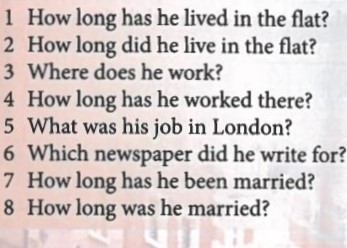HAVE / HAS + PARTICIPLE
| I have worked ✄I’ve | I have not worked ✄I haven’t | Have I worked? |
| You have slept | You have not slept | Have you slept? |
| He has eaten peas ✄He’s | He has not eaten meat ✄He hasn’t | Has he eaten nuts? |
| She has adopted a cat | She has not bought a dog | Has she adopted? |
| It has worked | It has not worked | Has it worked? |
| We have understood | We have not understood | Have we understood? |
| They have drunk | They have not drunk | Have they drunk? |
We use the present perfect:
- for something that started in the past and continues in the present:
They have been friends for nearly fifty years.
She has lived in Liverpool all her life.
- when we are talking about our experience up to the present:
I‘ve seen that film before.
He has written three books and he is working on another one.
For, since, already, yet, just, ever
Estas palabras se suelen emplear con el present perfect.
| ➣For: indica la duración de la acción. | ➣She has lived here for two years. Vive aquí desde hace dos años. ➣They haven’t eaten meat for decades No han comido carne desde hace décadas |
| ➣Since: «desde». Indica cuándo comenzó la acción. | ➣I haven’t seen her since 2004. No la he visto desde 2004. |
| ➣Already: «ya». Indica que la acción ya se ha realizado. | ➣We have already sold our flat. Ya hemos vendido nuestro piso. |
| ➣Yet: «todavía» en oraciones negativas, pero, «ya» en interrogativas. Al final de la oración. | ➣They haven’t started yet. Todavía no han empezado. ➣Have you called yet? ¿Ya has llamado? |
➣Just: Indica que la acción justo acaba de realizarse. | ➣I have just finished my homework. Acabo de terminar los deberes. |
| ➣ Ever: pregunta por tu experiencia. | ➣ Have you ever eaten a vegan burguer? ¿Has comido alguna vez una hamburguesa vegana? |
past ⇆ present perfect


reference: Headway Pre-Intermediate Oxford
Which of these questions are referred to John or to Karl Marx?

Obviously the questions in the present (3) and present perfect (1,4,7) refer to John, as he is alive and the actions continue up to the present. The four questions in the past (2,5,6,8) refer to Marx, as he is dead.
